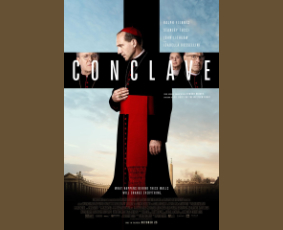Conclave, U.K./USA 2024. Directed by Edward Berger, written by Peter Straughan. Based on the novel Conclave by Thomas Harris.
CineStar Theater, Row 3, Seat 9. Original version.
(This post also appears at my Letterboxd account.)
Edward Berger’s 2024 Conclave is a thoroughly enjoyable movie with terrific actors and a breathtaking cinematography that is always epic and intimate at the same time, sustained and reinforced by incredible lighting and Fontaine’s use of wide lenses (on a Red V-Raptor) even for close-ups, so that there’s always a sense of the environment.
Now, off to some nitpicking.
Bertelmann’s music isn’t bad, far from it. But its placement is way too illustrative and intrusive, and at one point even suggests being diegetic which it can’t possibly be. (My SO hypothesizes that the music placement imitates certain documentary-style dynamics, which I think is a very good guess.)
Then, Emerson’s cut is at times not as organic as it could or should be, and later in the movie it even undermines Fontaine’s cinematographic intentions—in a conversation with Ellen Kuras, Fontaine discusses his reasons why he let the camera move less and less as the movie progresses—by following the path of characters in motion with what almost amounts to dynamic cuts.
Finally, while Straughan’s script is very good overall, Benítez’s pivotal speech is way too weak to have the impact it’s supposed and depicted to have. To be fair, the rhetoric as such isn’t noticeably stronger in Harris’s eponymous novel on which the script is based, but there the speech hits home a lot harder because of some vital details excised from both Tedesco’s and Benítez’s speech.
From Tedesco’s original speech in the novel:
My brothers, each time we file into the Sistine Chapel to vote, we pass, in the Sala Regia, a fresco of the Battle of Lepanto—I looked at it this morning—where the naval forces of Christendom, drawn together by the diplomacy of His Holiness Pope Pius V, and blessed by the intercession of Our Lady of the Rosary, defeated the galleys of the Ottoman Empire and saved the Mediterranean from slavery at the hands of the forces of Islam. We need some fraction of that leadership today.
And here, from Benítez’s reply speech in the novel, with a pointed stance against the invasion of Iraq at its center:
But my dear Patriarch of Venice, you forget I am the Archbishop of Baghdad. There were one and a half million Christians in Iraq before the Americans attacked, and now there are one hundred and fifty thousand. My own diocese is almost empty. So much for the power of the sword! I have seen our holy places bombed and our brothers and sisters laid out dead in lines—in the Middle East and in Africa. I have comforted them in their distress and I have buried them, and I can tell you that not one of them—not one—would have wished to see violence met by violence. They died in the love of, and for the love of, our Lord Jesus Christ.
On the one hand, there are valid thematic reasons why the script has to water these speeches down and render their original point almost unrecognizable, and there are also (sadly) pretty obvious reasons of a different kind if you have to remonetize a $20m movie in the current political climate. On the other hand, it clearly falls under the responsibility of the script to find a top-notch alternative solution that gets to the same point with a comparable level of oomph, which it entirely fails to do in this case.
But don’t get the wrong impression from all that nitpicking—direction, actors, and cinematography are absolutely amazing, and the movie fully deserves to be watched.
________________
All Movie Reviews
If you have something valuable to add or some interesting point to discuss, I’ll be looking forward to meeting you at Mastodon!

